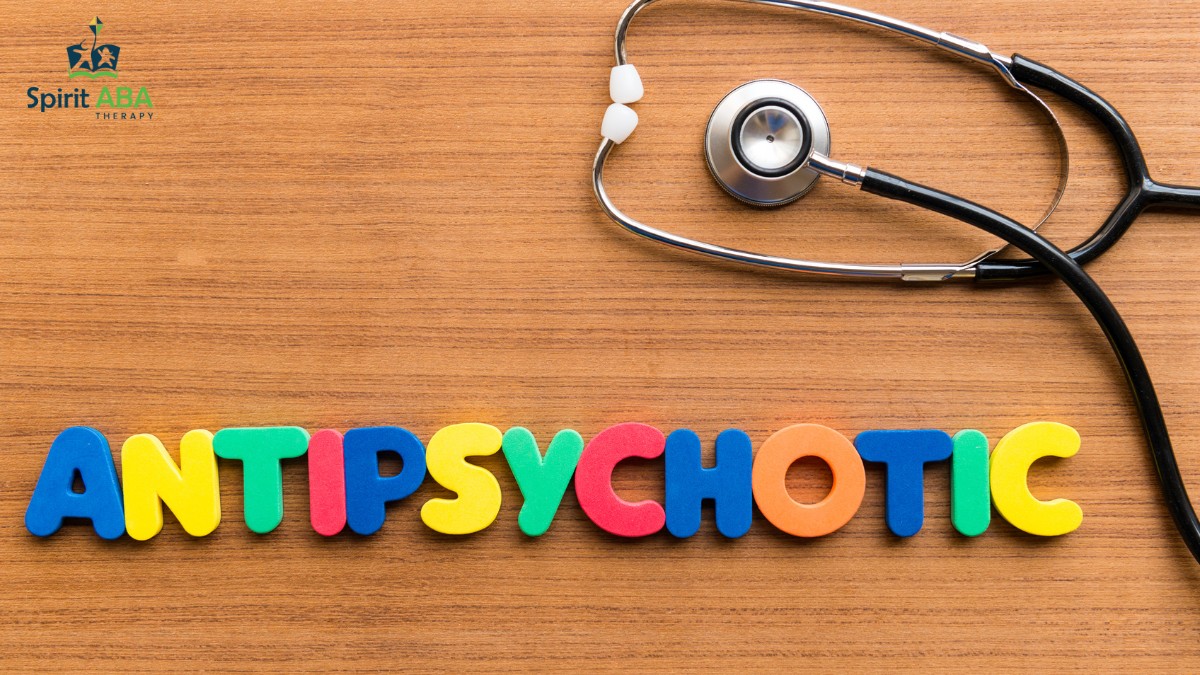Key Points:
- Antipsychotics are sometimes prescribed to manage severe behavioral symptoms in children with autism, not to treat autism itself.
- These medications can reduce aggression, irritability, and self-injury, but they also carry potential side effects.
- Alternatives like ABA therapy can offer effective, non-medication-based treatment support for long-term improvement.
Aggressive outbursts, self-harming, and emotional meltdowns can leave families feeling helpless. When therapies fall short, doctors may suggest antipsychotic medications. But are they safe? Will they help? Exploring the benefits and risks of antipsychotics for adults and kids with autism can guide parents toward a balanced, well-informed approach to care and support.
Can Antipsychotics Help Children With Autism?
Yes. Antipsychotics can help manage some behavioral symptoms in children with autism, but they don’t treat autism itself. These medications may reduce aggression, self-injury, and irritability, especially in more severe cases.
Why Are Antipsychotics Prescribed for Autism?
Children with autism may struggle with intense behaviors that interfere with daily life—aggression, severe tantrums, and self-injury. When these behaviors become dangerous or unmanageable, some doctors turn to antipsychotics for support. Though not a cure for autism, these medications can significantly reduce severe behavioral symptoms and improve quality of life.
The two most commonly prescribed FDA-approved antipsychotics for autism are:
- Risperidone (Risperdal): Approved for children ages 5–16 to treat irritability associated with autism.
- Aripiprazole (Abilify): Approved for children ages 6–17 for the same reason.
Other antipsychotic medications might be used “off-label,” meaning they’re prescribed even though they haven’t received official FDA approval for autism-related use.
What Behaviors Do Antipsychotics Target?
These medications are typically reserved for the most challenging behaviors that can put a child or others at risk. Understanding the scope of what they treat can help guide decision-making.
Antipsychotics may help reduce:
- Aggression or violent outbursts
- Severe mood swings or meltdowns
- Self-injurious behaviors (like head-banging or biting)
- Extreme irritability or persistent agitation
- Disruptive behaviors that don’t respond to other interventions
Doctors often recommend these medications when behaviors have become so severe that they interfere with therapy, learning, or daily routines—and when other strategies haven’t worked.
What Are the Benefits of Antipsychotics for Autism?
It’s important for parents to weigh both short-term relief and long-term impacts when considering medication. Here’s how antipsychotics can support children with autism:
- Rapid symptom relief for severe irritability and aggression
- Improved safety for the child and others
- Greater ability to engage in learning and therapy
- Better sleep and routines in some cases
When used appropriately, antipsychotics for autism can bring real relief—for both the child and the family. Some children show a marked improvement in behavior within a few weeks, which may allow them to participate more fully in school, therapy, and social activities.
What Are the Risks and Side Effects?
While many children tolerate antipsychotics well, side effects can occur—and some can be serious if left unmonitored. Close communication with your child’s doctor is essential throughout treatment. Understanding these potential downsides can help families make more informed choices.
- Weight gain and increased appetite
- Drowsiness or sedation
- Constipation or stomach discomfort
- Tremors or restlessness
- Increased cholesterol and blood sugar levels
- Tardive dyskinesia
- Hormonal changes
- Seizures
- Neuroleptic Malignant Syndrome
Regular check-ins, lab work, and detailed behavioral tracking can reduce the risk of these complications.

Are Antipsychotics Always Necessary?
No, and in many cases, they’re not the first line of treatment. Here’s how parents can explore options before, during, or instead of starting medication.
Antipsychotics are typically used when a child’s behaviors are severe or resistant to other forms of treatment. But many families find that therapy—especially Applied Behavior Analysis (ABA)—can successfully manage behaviors without the need for medication.
Behavioral therapy focuses on teaching children how to cope, communicate, and regulate themselves in more appropriate ways. For some children, this is enough. For others, medication may help create a more stable foundation so therapy can be more effective.
What Should Parents Consider Before Starting Antipsychotics?
Making a decision about medication is deeply personal. Asking the right questions can help parents feel more confident and involved in the treatment process.
Here are some questions you can ask:
- What behaviors are we trying to treat?
- Are there non-medication options we haven’t tried yet?
- What are the short-term and long-term risks of this medication?
- How will we monitor side effects?
- What’s the plan if the medication doesn’t work—or stops working?
Parents should never feel rushed into starting medication. A thorough conversation with a pediatric psychiatrist can clarify whether antipsychotics are appropriate for your child’s situation.
Are There Alternatives to Antipsychotic Medications?
For many families, therapy provides lasting solutions that medication alone cannot. Here’s how other treatment options compare and what they can offer.
Antipsychotics may help reduce intense symptoms, but they don’t teach skills. This is where therapies like ABA activities come in—addressing the underlying causes of behaviors and building positive routines that promote independence.
In some cases, a combination of therapy and medication offers the best results. But families often find that with the right support, medication becomes unnecessary—or can be used for a shorter period.
How Can ABA Therapy Work Alongside or Instead of Medication?
ABA therapy offers structured, consistent behavioral support that can either reduce the need for medication or complement its effects. Learn how this therapy can support long-term growth.
ABA (Applied Behavior Analysis) focuses on teaching functional skills while reducing behaviors that interfere with daily life. For children taking antipsychotics, ABA can reinforce positive changes and help maintain stability. For those not on medication, ABA often provides enough behavioral support to avoid it altogether.
Through one-on-one sessions, therapists help children:
- Improve communication and emotional regulation
- Decrease aggressive or harmful behaviors
- Develop independence in daily routines
- Learn to cope with sensory and social challenges
The key difference? While antipsychotics may mask symptoms, ABA addresses root causes and teaches lifelong skills.
Looking for More Than Medication? Try ABA Therapy in Iowa, Colorado, and Nebraska
Medication may offer short-term help, but real progress comes from learning and growing in everyday life. That’s where behavioral support matters most.
Spirit ABA provides family-centered, evidence-based ABA therapy in Iowa, Colorado, and Nebraska to help children with autism build the skills they need to thrive. Whether your child is currently on antipsychotics—or you’re exploring other options—ABA therapy can make a meaningful difference.
Our therapists work closely with families to reduce challenging behaviors and promote lasting development, all in a caring, personalized environment.
If you’re looking for guidance, support, and real growth beyond medication, get in touch today to learn how ABA therapy can help your child move forward with confidence.


